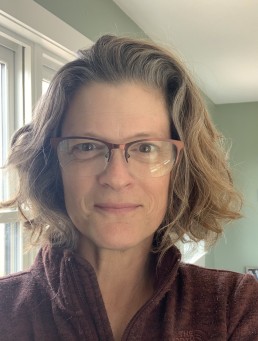3 Flash Fictions
by Lea Page
The Bees Come at Night
I sit up in bed when we see headlights coming down the road—a truck of some kind. We don’t get many visitors this way. Cows summer here, but mid-May is early. If it is cows, we’ll need to get up and fix the electric fence. The snowplow took out an end-post last winter, and we meant to fix it, but you know how these things go. In the crush of every day, sometimes motivation has to stare you in the face with its insatiable hunger and bovine inevitability.
A forklift unloads boxes—ah, bees, not cattle. Each year, an apiary delivers stacks of hives to an enclosure just west of us. I imagine the bees waking at dawn, disoriented—same house, different yard. Although the wild bees come of their own volition, I can’t say the boxed bees don’t belong, and this seems like as good a place as any, only, last fall, our neighbor coated his alfalfa with Round-Up. Weeds had filled his fields, so he killed everything.
I grow poppies, lilacs, roses and cosmos, but the bees come first and it seems to me, happiest, to the borage. I planted it only the once, and now it shows up everywhere. I can’t say I’m able to recognize, let alone mitigate, a hostile environment. I can’t say I understand belonging, either, but I know what welcome feels like. It feels like borage: random, wild, self-seeding.
Confirmation Bias
My son tells me that elephants feel—when they see humans—the same as we do when we see puppies: so cute! I could look this up, find out if it’s true, but I don’t want to know. There’s something inarguable about an elephant’s perspective. The phrase, “deliberative body,” comes to mind.
I could understand if elephants held us in contempt for our casual and destructive ways, so any benevolence seems unlikely to be accidental. But cute? Us? One could feel diminished—even though that might only reflect the reality of our relative sizes. On the other hand, one could feel, also, graced, as if by gods, gods who know the patience of grandmothers, who see potential in small fry despite their whining, their incessant squabbling and their being constantly underfoot.
I consider the source of this new information. My son bestowed it upon me, not just as a fun fact—he doesn’t really traffic in fun facts, that would be my husband—but as a kind of currency he saved up just for me, because he knows I tend toward the cynical. He grew up in the presence of good dogs and a prodigious amount of dirt, so he sees the world differently. There’s hope for us, after all, he is saying, but he knows I might not take anyone’s word for it, including his, but I might—I just might—believe the elephants.
Audition
The decking, newly laid over the new concrete foundation, is a raft adrift on a sea of damp grass and crushed sage. My daughter side-steps the puddles, walks to the edge, and faces her audience: the purple-grey Rocky Mountains, reclining to the south. Listening to music only she can hear, she taps out her dance, wearing her signature red glitter shoes, the ones she wears to ride her bike and do her chores and brush her teeth, the ones she has worn every day since they arrived in a birthday package from Grandma, who succumbed to temptation in the girl’s shoe aisle at a Target a thousand miles away, the grandma who will, later, ask my daughter what she did to bring it all upon herself.
Soon, she’ll wear the glitter shoes to her first day of kindergarten, along with an outfit she will choose herself, a mad mixture of colors and prints, an outfit of joy, of arms flung wide, an outfit that will telegraph like nothing else that she is not from around here. Who is to say what, exactly, brought it on, the turning of shoulders, the knowing looks, the confounding and myriad ways in which little girls know how to communicate: Not you. Never you.
A hundred yards past the stage, rows of cottonwood trees reflect the sound back, adding a complex syncopation to the rhythm of her dancing feet. Sun plays across wet sheets of plywood, and the wind—there is always a wind—sets the trees and grasses into motion for a susurration of applause.
Lea Page’s work, nominated for Best of the Net and Pushcart prizes, has appeared in The Rumpus, River Teeth, Pithead Chapel, North Dakota Quarterly, High Desert Journal, and more. She is the author of Parenting in the Here and Now.

